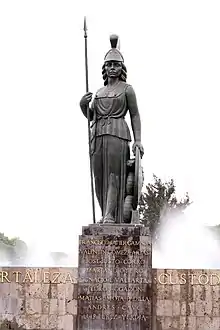Statue of Minerva, Guadalajara
A statue of Minerva, the Roman goddess of wisdom and strategic warfare (colloquially known as La Minerva), is installed in a roundabout fountain in Guadalajara, in the Mexican state of Jalisco. It is a bronze sculpture supported by a large pedestal that names 18 notable citizens of the city. The statue has indigenous facial features and holds a spear and a shield. The phrase "May justice, wisdom and strength, guard this loyal city" is engraved as well. Initially, the statue was criticized by the citizens, but since then it has become a symbol of the city.
| Statue of Minerva | |
|---|---|
 The statue in 2011 | |
| Artist | Joaquín Arias |
| Year | 1957 |
| Medium | Bronze sculpture |
| Subject | Minerva |
| Dimensions | 11 m (36 ft) |
| Weight | 4.5 t |
| Location | Guadalajara, Jalisco, Mexico |
| 20°40′27″N 103°23′14″W | |
Description and history

A landmark of the city, the statue was built between 1956 and 1957, requested by the governor of the state, Agustín Yáñez. The statue represents the Roman goddess of wisdom and strategic warfare, Minerva. Yáñez wanted Guadalajara to be recognized as the "Athens of Mexico".[1] It was unveiled on 15 September 1957.[2]
It is a bronze sculpture created by Joaquín Arias and Pedro Medina Guzmán, who cast it in Aguascalientes,[2] and the architect was Julio de la Peña.[3] Minerva features a Late Roman ridge helmet and a goatskin aegis covers her breast. She holds a spear with her right hand and a shield with the left one.[2] Her face has indigenous facial features as Arias modified the project, which originally requested a Greek figure.[1] Arias modelled the statue on notable women of Jalisco that he had photographed.[4] There is a rumor that says that Arias based on the face of Yáñez's wife.[1] The project cost Mex$1,250,000 of which $75,000 went to Arias.[4]
The statue is 8 meters (26 ft) tall[3] and weights 4.5 metric tons (4.4 long tons; 5.0 short tons).[2] At her feet, the following slogan is written: "Justicia, Sabiduría y Fortaleza, custodian a esta leal Ciudad" (transl. May justice, wisdom and strength, guard this loyal city).[2][3] The pedestal is 25 meters (82 ft) long and 3 meters (9.8 ft) high is inscribed with the names of 18 notable citizens.[2] Symbolically, the statue guards the city.[3] The following 18 names are inscribed:[3]
- Francisco Javier Gamboa
- Valentín Gómez Farías
- José Justo Corro
- Mariano Otero
- Ignacio L. Vallarta
- Pedro Ogazón
- Matías de la Mota Padilla
- Luis Pérez Verdía
- Fernando Calderón
- José María Vigil
- José López Portillo y Rojas
- Enrique González Martínez
- Manuel López Cotilla
- Salvador García Diego
- Pablo Gutiérrez
- Jacobo Gálvez
- Manuel Gómez Ibarra
- Andrés Cavo
The statue is hollow and it was restored in 2021 as it showed cracks in its spear, knee and torso.[4]
Reception
Initially, the statue was received unfavorably by the city's inhabitants, as they considered it did not represent the goddess in an appropriate manner. Since then, the reception turned positive and it has become a popular destination of the city.[1][3][5] Historian Bettina Monti Colombani found a comment that said: "If the painting of statues in this fashion continues, it won't be long before we have the Autochthon Minerva transformed into the 'green Indian'".[lower-alpha 1] Monti Colombani also found that the first time the statue was integrated by the citizens was in 1987 when a group of C.D. Guadalajara fans celebrated there the victory of the team. They also attempted to dress her in the team's shirt.[4]
Notes
- Quote in Spanish: "Si se sigue la pintura de estatuas en esta guisa, no tardará mucho el día que tengamos la 'India verde' en la Minerva Autóctona".[4]
References
- Velázquez, Yenzi (18 August 2016). "La Minerva, polémica desde su origen". Diario NTR (in Spanish). Retrieved 11 October 2021.
- "La Minerva Guadalajara". Patronato Histórico. Government of Mexico. Archived from the original on 11 October 2021. Retrieved 10 October 2021.
- "Conoce la historia de La Minerva, el emblemático monumento de Guadalajara". El Heraldo de México (in Spanish). 23 February 2021. Archived from the original on 28 February 2021. Retrieved 10 October 2021.
- Monti Colombani, Bettina (20 January 2021). "La Minerva". El Ciudadano Jalisco (in Spanish). Retrieved 11 October 2021.
- "La Minerva, insignia de la Guadalajara cosmopolita". Informador.mx (in Spanish). Guadalajara. 14 February 2017. Archived from the original on 6 October 2021. Retrieved 10 October 2021.
External links
 Media related to Statue of Minerva in Guadalajara, Mexico at Wikimedia Commons
Media related to Statue of Minerva in Guadalajara, Mexico at Wikimedia Commons